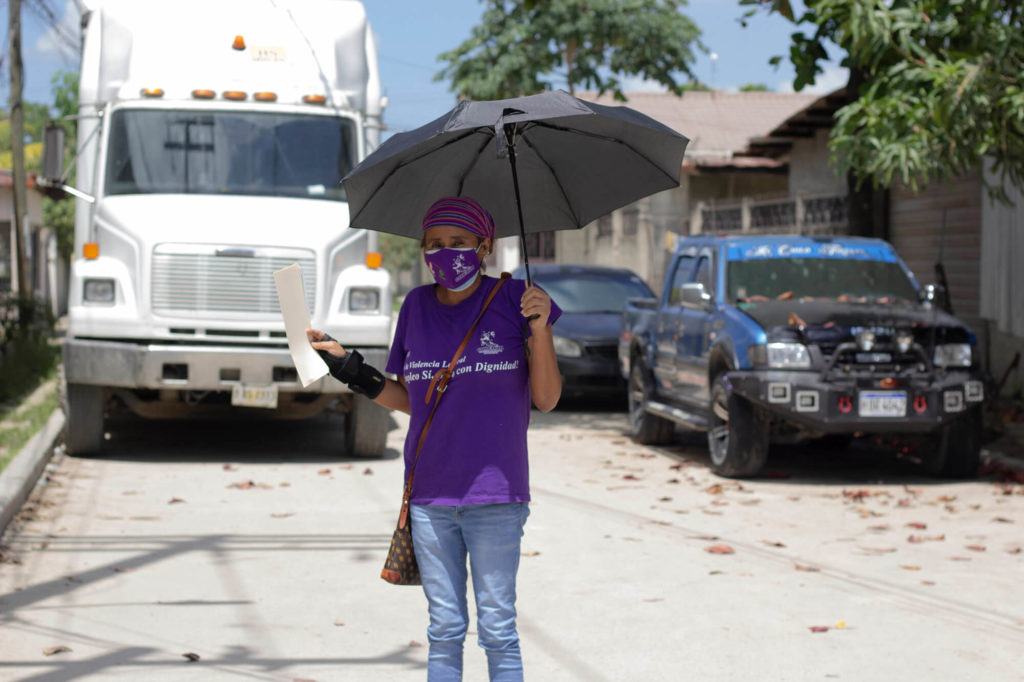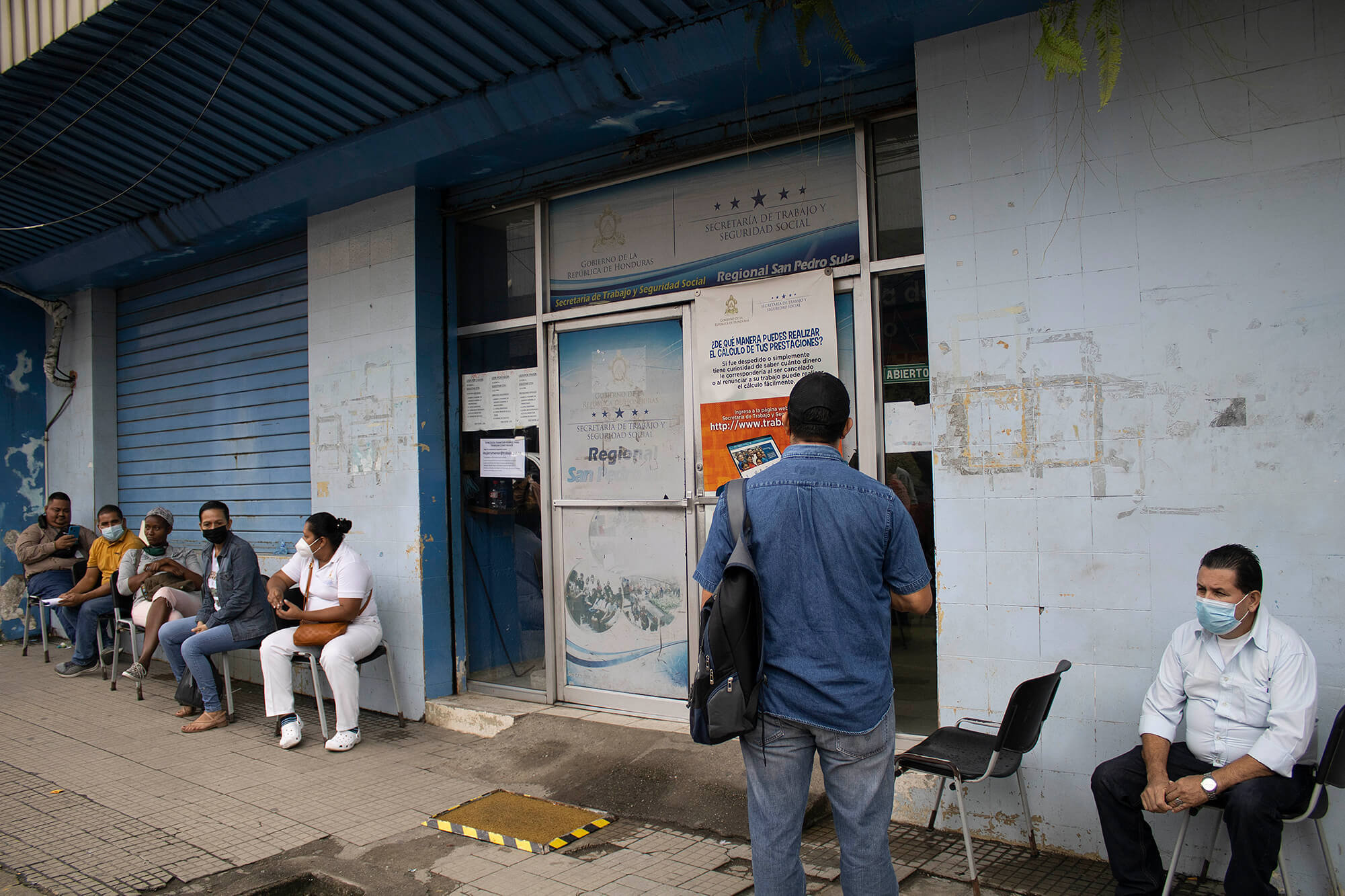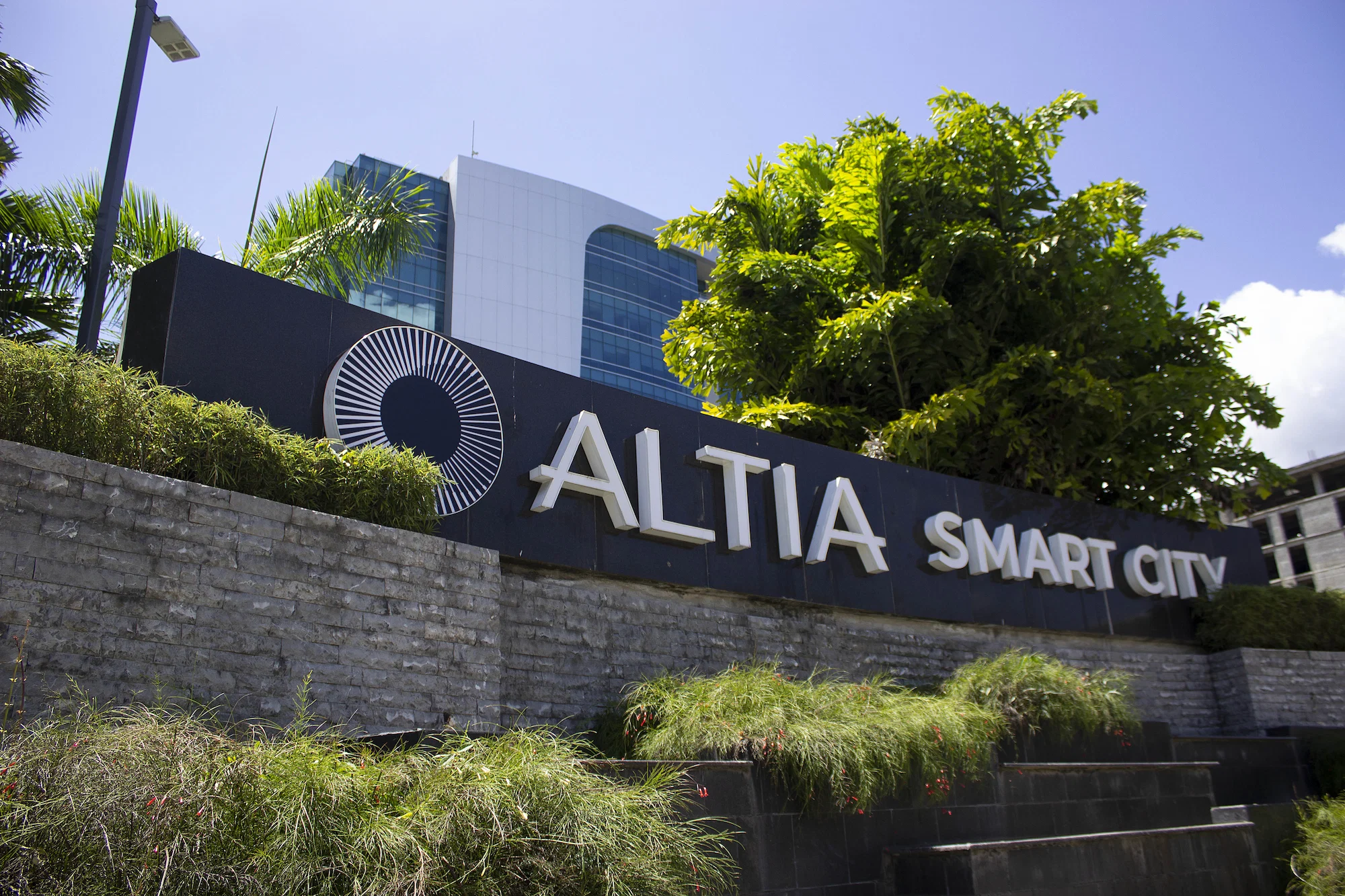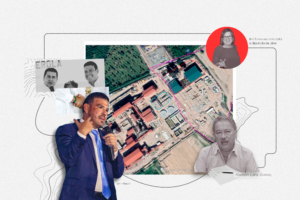Olivia Aurora began her legal battle against Grupo Karims when it fired her in September 2016. This multinational conglomerate is controlled by Yusuf Amdani, a man of Pakistani origins and Honduran citizenship, who owns the Altara shopping center, Altia Business Park, Merendón Hills, and the giant Green Valley manufacturing complex.
By Allan Bu
Photos by Antonio Gutiérrez
Olivia Aurora sometimes wakes up in the early hours of the morning, her slumber interrupted by severe shoulder and cervical pain. While her family rests, Olivia posts, “I can’t sleep.” on Facebook. In another part of northern Honduras, another sleepless woman reads Olivia’s post and replies, “Same here.”
Olivia moved to San Pedro Sula about 14 years ago from Choluteca, in southern Honduras. Her plan was to work hard and earn enough money to pay for her son’s education and give him more opportunities than she had. It’s the dream of almost every parent, and it was also Olivia’s dream.
For the next decade, Olivia worked hard at Pride Manufacturing, a clothing manufacturer (“maquiladora”) and part of Grupo Karims, a multinational company owned by Yusuf Amdani. One of the richest men in Honduras, Amdani owns the Altara shopping center, Altia Business Park, Merendón Hills, and the giant Green Valley Industrial Park. Forbes magazine lists Amdani as one of the richest men in Central America.
“I had so many dreams. I wanted to give my son an education and protect him from the hardships that I endured. Thank God he was able to get a job and is finishing his university studies because my health problems put all my dreams on hold,” says Olivia.
These days, the former Pride Manufacturing employee can hardly work at all, and even prefers to drink water from a plastic bottle because it weighs less. “I’m dependent on my family’s help. I can’t even open a bottle of water ─ I’m too weak,” she says.
During her 10 years at Pride Manufacturing, Olivia constantly performed repetitive motion tasks such as sewing the seams on shirt sleeves. It took a toll on her health, she said, “High production targets and repetitive motion tasks will eventually cause you harm.”
The only thing Olivia and hundreds of other workers who suffer from occupational health conditions can do is learn to live with the pain and discomfort ─ their conditions are irreversible. The health care centers prescribe medications to ease some of the pain, but the inescapable reality is that they will have to deal with their conditions for the rest of their lives. Olivia can hardly sleep at night ─ sometimes only two hours. She writes about her pain on social media when she feels overwhelmed, and former colleagues with the same problems almost always post a reply.
On September 26, 2016, Pride Manufacturing fired Olivia. After 10 years in the clothing factory, her shoulders, wrist, and cervical vertebra were damaged. The company said it was downsizing when they fired her. But that same day, they also dismissed other people with occupational health problems caused by their work at Pride.
“After the layoffs, people at the factory said that [management] had discharged all the hospital patients,” said Olivia during our interview in the offices of the Honduran Women’s Collective (Colectiva de Mujeres de Honduras – CODEMUH).
“That’s how most of these employers refer to us. After working so hard for them, we became disposable and they just threw us away,” she said, “They never provided any health care, knowing that we suffer every day from occupational health conditions.”
When Olivia received her job termination notice, she refused to accept the severance payment because she wanted to continue receiving social security benefits. She already had occupational health conditions that were not formally certified, so she decided to fight the government’s indifference and the economic empire that fired her. When she was let go, she was already a member of COHDEMU, an organization that has been defending maquiladora worker rights since 1990. That was the beginning of a five-year battle.
“She is one of the few that never gave up,” said María Luisa Regalado, CODEMUH’s founder and director. Regalado has been defending women’s rights for more than 30 years, and says, “We will always support [our members] until the very end, as long as there is some chance of prevailing.”
Two victories
In October 2016, after assessing the viability of Olivia’s case, CODEMUH’s legal team filed a lawsuit on her behalf in the Choloma Labor Court. Olivia sued for reinstatement to an equal or better position, plus wages and benefits lost since her termination. In February 2020, a judge ruled in her favor, ordering the company to reinstate Olivia and pay back wages and accumulated benefits. Pride Manufacturing quickly appealed the decision but lost the appeal in October 2020.
Regalado claims that Pride Manufacturing then closed their Choloma operations and moved them to Green Valley, an industrial park located in Naco, Cortés. “We know that [Pride] didn’t shut down altogether, and we believe that it has started up again in Green Valley. That was a farce and an insult to working people. They just wanted to get rid of people with health issues, because they know that long-time employees are having serious health problems,” she says.
According to Regalado, Pride Manufacturing “maliciously rejected the ruling [in favor of Olivia] and subsequently closed operations, leaving workers with no benefits or social security. Olivia is one of these workers, but she has two court rulings ordering the company to reinstate her and pay back wages.”
The Cortés Business Registry indicates that Pride Manufacturing was incorporated in 1998, but that it is not currently operational. The majority shareholder is Mohamed Yusuf Amdani, and other shareholders include Bessy Fletes, Rafael Silva, José Roberto Ramírez, and Luis Edmundo Mejía.
Contracorriente reporters visited the Grupo Karims office in Altia Business Park, but the guards did not allow us to enter. Instead, they gave us a phone number that no one answered, and no one responded to the two emails they gave as, either.
On March 25, 2022 a Grupo Karims executive called Contracorriente to explain that she was reading up on Olivia’s case in order to communicate the company’s position on the matter. She stated that Grupo Karims always aims to be respectful of people’s rights. However, there was no further communication from Grupo Karims on the matter, and no one answers when we attempted to call the number back.
On November 6, 2021, Olivia and a group of fellow CODEMUH members held a sit-in in front of Altia Business Park, where the country’s largest call center is located. The protestors demanded Pride Manufacturing’s compliance with the legal rulings in Olivia’s case and refused to disperse until the company agreed to negotiate. Despite the fact that the Honduran justice system had ruled against the company twice, it still insisted on more negotiations.
“It wasn’t easy, but we finally wrapped up negotiations in January 2022 and they agreed to pay her,” said María Luisa Regalado.
Grupo Karims did not agree to employ her in any of its companies, but promised to pay her back wages from 2016, as well as her accumulated benefits. It also agreed to pay for Olivia’s medical tests and the surgery on her right hand if she provided a report from the Ministry of Labor certifying that her medical conditions were work-related.
Olivia’s fight for justice soon hit a wall ─ a sluggish government bureaucracy. When she was let go, Olivia had not yet obtained an occupational health report for the pain in her shoulders and hand, nor for the cervical condition. However, in January 2022, she was finally able to submit her medical reports to the labor ministry in San Pedro Sula. The next step was for the ministry to assess the extent of her injuries and disability. After several follow-up visits to the labor ministry, she was told in February that her file would be forwarded to the ministry’s main office in Tegucigalpa for signature. In early March, CODEMUH staff learned that Olivia’s documentation still had not been sent to Tegucigalpa.
Olivia has yet to be paid by Grupo Karim. The settlement that Grupo Karim agreed to has stalled because of the labor ministry. Without the ministry’s assessment, the settlement cannot be paid out, and Olivia has to continue waiting.
“I haven’t had a job since Pride Manufacturing fired me. I’ve been waiting five years for this money and to receive medical care, but then the company closed,” says Olivia.
“Here we have a case of either negligence or complicity [with Grupo Karim] by the labor ministry. I’m publicly making these allegations because we have a new government now, and we hope that they will rectify all that was happening under the previous administration. This cannot continue because they are destroying the lives and health of workers,” says Maria Luisa Regalado.
Contracorriente visited the labor ministry in San Pedro Sula on two occasions to understand the institution’s position on Olivia’s case and to obtain its response to Regalado’s allegations.
Regional Director Julieta Ulloa told Contracorriente that she has only held her position for a month and doesn’t know the details of Olivia’s case.
“Our instructions from the president and Labor Minister Sarahí Cerna are to work collaboratively, and to do it with transparency and speed,” said Ulloa.
Regarding the delays and long waits for workers, Ulloa said that they are “trying to work through a backlog of cases with the few resources that we have. There are large numbers of workers in the San Pedro Sula area and right now we only have 33 inspectors, who have various responsibilities. This is not enough, but we are finding ways to avoid delays for workers when they submit a claim.”
It’s commonly said among workers and those that defend them that the labor ministry prioritizes the interests of big business. Ulloa defended her ministry and said, “Sometimes people say that out of ignorance of the facts. Workers make baseless claims that [labor ministry] inspectors are sell-outs. Meanwhile, the employers say that we always side with the workers. We try to maintain a balance and ensure compliance with the Labor Code.”
Ulloa insisted that she intends to promptly address as many worker claims as possible, “We hope to be able to help more workers, but the law will ultimately determine who will win each case. We are asking the public to believe that we are trying to do things the right way.”
María Luisa Regalado says that worker claims get bogged down in a morass of government agencies. She wants the Honduran Social Security Institute to issue occupational health reports within 90 business days. However, CODEMUH is working on cases that have taken up to three years for a ruling.
“It becomes an ordeal for the workers. Olivia initiated a case with the Honduran Institute of Social Security, but they didn’t act in time. So by the time Grupo Karims let her go, she didn’t even have a ruling on job reassignment,” said Regalado.
She says that it takes years for the labor ministry to conduct their evaluation and complete the job reassignment process. “If a worker is fired and decides to make a claim, she can get stuck in the judicial and administrative systems for three or four years, and sometimes even more. It’s designed to wear down the workers. They know that workers don’t have the financial resources to wait it out. The government drags out a long process that’s full of obstacles, so workers often just give up,” she says.
“If a worker is fired and decides to make a claim, she can get stuck in the judicial and administrative systems for three or four years, and sometimes even more. It’s designed to wear down the workers,” María Luis Regalado (CODEMUH)
Olivia’s struggle
“I made the decision to demand reinstatement so I could recoup my health care benefits. That’s the main reason, because I have irreversible damage to my wrist, shoulders and cervical vertebra. I need medical care for this”, says Olivia. She also believes that her request for a job reassignment was the reason for her termination. When an employer finds out that a worker is initiating the job reassignment process “what they do is dismiss the worker ─ that’s their solution,” says Olivia.
“Women like me are suffering. Having an occupational health problem is terrible ─ it causes us stress, which leads to high blood pressure. The original condition causes other health problems,” she says.
Olivia’s struggle began five and a half years ago and, despite two rulings in her favor, she still has not recovered her social security benefits and has not returned to work.
“It’s unfair what they do to manufacturing workers. Employers ignore the legal rulings. Not only in my case. Several other workers I know have sued and won, but the employers just appeal the decisions. They violate our rights because we are women, and that’s wrong. We must demand our human and labor rights,” said Olivia.
Olivia’s claims are backed up by CODEMUH’s records, which show that 70 people are currently awaiting rulings on job reassignments, some of whom have been waiting up to three years. Their records also document 23 unresolved worker lawsuits for human rights violations, and the case of 24 female workers who sued Delta Apparel and lost.
“The judge’s ruling was political ─ there was no mandate for the employer to pay accumulated benefits. This decision was even ratified in a Supreme Court plenary session,” said María Luisa Regalado.
“We have to keep fighting. There are many obstacles, but we have to overcome them,” urged Olivia, who receives psychotherapeutic treatment from CODEMUH to cope with pain in her shoulders and neck. CODEMUH is one of several organizations that work with people suffering from work-related occupational health conditions.
Olivia doesn’t just have legal problems ─ her health continues to deteriorate. “The pain I had on September 26, 2016 when I was dismissed from my job persists today. I depend on my husband and son to do things for me. I’m weak and I drop things. I can’t even open a door. That’s what manufacturing work in Honduras is doing to us,” says Olivia.
“The pain I had on September 26, 2016 when I was dismissed from my job persists today. I depend on my husband and son to do things for me. I’m weak and I drop things. I can’t even open a door.” Olivia
“Work environments should be adapted to humans. This means that the tools and processes used to perform a task have to be adapted for humans. The problem around the world, and especially in our country, is that tasks aren’t adapted to the people who do them. Instead, people are forced to adapt to the task,” says Dr. Gustavo Hernandez, an orthopedist and specialist in musculoskeletal disorders.
Grupo Karims
Grupo Karims is a business conglomerate primarily owned by multimillionaire Mohamaad Yusuf Amdani, Pakistan-born, and a naturalized Honduran citizen. He invested heavily in the country’s real estate and manufacturing sectors. Grupo Karims is headquartered in Pakistan, but has investments in the United Arab Emirates, the United States, Mexico, Nicaragua, El Salvador, the Dominican Republic, and Honduras.
According to its website, Grupo Karims began investing in Honduras in 1991, and its businesses there now include Honduras Spinning Mills, Pride Yarn, Pride Chemicals, and Pride Manufacturing, which still appears on the website despite having closed down in Choloma.
Grupo Karims has also invested in Honduran real estate. Its Altia Smart City complex in San Pedro Sula includes the Altia Business Center, which houses the country’s largest call centers. It also developed the Rec-Zen recreation center and the Altara shopping center in San Pedro Sula. In Tegucigalpa, Grupo Karims has a commercial complex with a similar name.
Grupo Karims built the luxury Merendón Hills housing complex in San Pedro Sula, where a home can cost up to US$675,000. The homes were built on the slopes of the El Merendón mountain range, which is the main “lung” in northern Honduras. Nonetheless, the Grupo Karims website touts its environmental responsibility. Univisión, a U.S.-based media company, named Amdani in its 2015 list of the richest people in Central America.
Grupo Karims also owns the Green Valley Industrial Park, one of the largest in Central America. Located in the community of Naco, Cortés, the enormous industrial complex employs more than 10,000 people. Next door, the company built a residential development also called Green Valley. Unlike Merendón Hills, government-subsidized homes in Green Valley can be purchased for US$80 a month.
Maquiladoras in northern Honduras provided new job opportunities for women. Anthropologist Adrianne Pine’s study titled “Tu eres gallo… pero la de los huevos soy yo” (“You’re the rooster… but I lay the eggs” in English) (TRACE, June 2009) found that women held 70% of the jobs in maquiladoras. Pine’s study also revealed that, “Many female maquiladora workers in Honduras are sexually harassed by their bosses, suffer harm to their physical and emotional health, and are denied their basic labor rights when they lodge complaints.”
CODEMUH’s Regalado hopes that the new administration will focus more on the problems of the workforce, “President Xiomara Castro promised to support women and prioritize our problems. It’s too soon to say, but we are waiting to see what she does for maquiladora workers.”
In Choloma, the center of the country’s maquiladora industry, Olivia is still waiting for her case to finally be resolved. She won’t get her job back as she demanded back in 2016 when her struggle began, but she is close to overcoming a sluggish government bureaucracy and resistance from one of the most powerful business groups in Central America. She is almost totally dependent on her family now, as she sits and waits.
“I no longer have any strength in my hands. I gave almost everything to the maquiladora,” she said.








